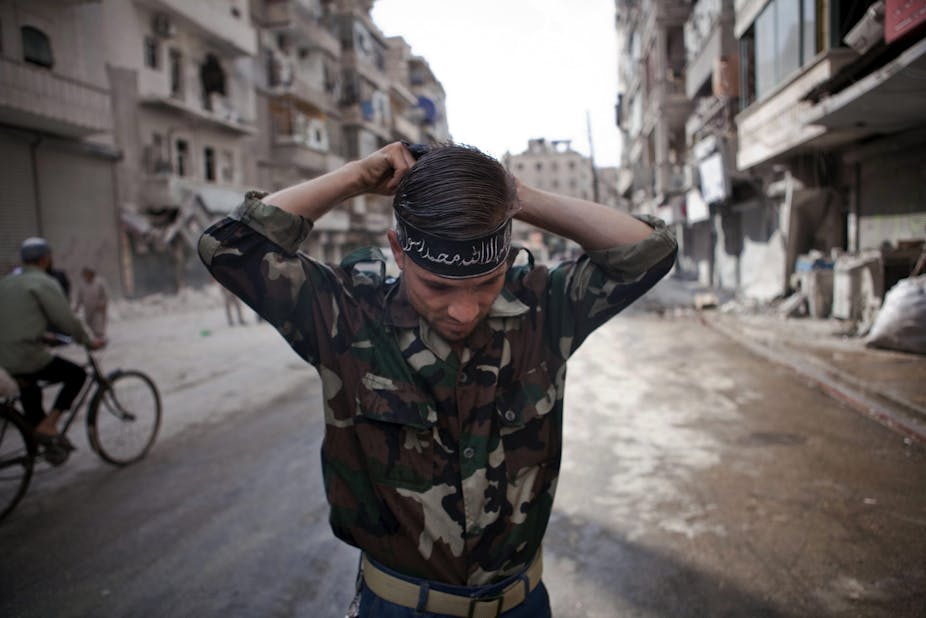Syria continues to be gutted, physically and psychologically, every day. Her people are terrorised and killed, infrastructure is decimated, and historical monuments are razed with astonishing levels of brutality.
Syrian armed forces attack the opposition forces with aircraft, tanks, mortars, artillery, and air bombing. The armed opposition defends its ground with stolen Syrian army tanks, surface to air missiles, and heavy artillery funded by foreign governments and individuals.
A new National Coalition for the Syrian Revolutionary and Opposition Forces was established in Doha on 11 November 2012. The Secretariat General of the 57-state member Organisation of Islamic Cooperation urged it to “respond to the legitimate aspirations of the Syrian people … preserving the unity, security and stability of Syria.”
But the pressing questions are: will the new opposition coalition be a legitimate representative of the Syrian people? And, are the aspirations of the Syrian National Coalition and the Syrian people at present mutually exclusive?
The Free Syria Army, the revolutionary militant arm of the Syrian National Coalition, has safe haven and supply lines in Turkey, is funded by Qatar and Sunni Arab oil-rich States. It is supported with surveillance, reconnaissance, training, protective equipment, and sustenance by the USA, Britain, France, and Germany, and according to the Council on Foreign Relations, by al Qaeda.
The Free Syria Army forms the core of the armed opposition. But the majority of armed militants in Syria who call themselves “Free Army” in fact comprise Islamist brigades, mercenaries, criminal opportunists, and al Qaeda. Syrians’ appetite for revolution is tempered by their ascendance.
Medecins Sans Frontieres co-founder, Jacques Beres, reports at least half of Free Syria Army fighters he treated in Aleppo in August were not Syrian, and were driven by the establishment of an Islamic state ruled by Sharia law.
The Muslim Brotherhood is central to the establishment and durability of both the Syrian National Coalition and the Free Syria Army. A Sunni political movement historically antagonist towards secular nationalist government, the Muslim Brotherhood is now amenable to secular forms of government and instead staunchly opposes Shiism. The Brotherhood characterise Shias as apostates, a crime under Islam, who are thereby unworthy to govern a majority Muslim country.
The Free Syria Army has destroyed and harassed state media, and the Arab League has blocked state-run Syrian channels from satellites for inflammatory broadcasts. Meanwhile, the opposition broadcasts 24-hour propaganda glorifying martyrdom towards the downfall of the government. Europe has followed suit in blocking Syrian state media.
Ownership of the Syria “story” is critical when the stakes are so high. Syria is the game board on which players contest ideologies, but also whose oil and gas pipelines will traverse the country to the Mediterranean ports.
The sweeping trend of secular, democratic aspirations in the region thus makes the revamp of the Syria National Council into the Syria National Coalition with former Syrian Communist George Sabra, and former Imam, Sheikh Ahmed Moaz al-Khatib, at the helm a great improvement in PR for Gulf Arab and Western allied players.
But the immediate calls by nominal Christian Sabra and “moderate” al-Khatib, based in Cairo under Muslim Brotherhood care, for an increase in arms and an escalation in fighting, offer little promise for the “unity, security and stability” of their ravaged country.
Alternatively, the Mussalaha (reconciliation) movement is providing a framework for civilian and religious leaders of all persuasions in Syria to achieve small resolutions in local conflicts and impasses. This ought to give pause to the prevailing belief that more force with more fighting will achieve best results.
The Syrian government has appointed a new Minister of State for National Reconciliation Affairs, Ali Haidar, who is mandated to bring all parties together with assurances of blanket general amnesty. The government insists that the best solution for Syria will not be found through weapons, through one side defeating the other, or through excluding the option for genuine negotiation of a peaceful political reform process.
The Australian government continues to side with non-Syrian powers who arm insurgents in Syria, and Foreign Minister Bob Carr denies knowledge of Islamist Al Qaeda fighters in Syria, going further to propose assassination as part of a political solution. But surely the new Syrian coalition’s first duty is to end the hardship, not prolong it.
Sabra and al-Khatib uniquely have been given the opportunity to give power back to the Syrian people – free from fear and force. With their strong political activist pedigrees in their home country, they can leverage support for the new coalition as legitimate interlocutors within Syria, rather than from outside. From that position they could gain an effective ceasefire, and lobby the disparate opposition movements in Syria to embrace full and unbiased participation in preparations for a new democratic government.
If this is not the intention of the new-look Syrian National Coalition it will be rejected by the government, by minorities, and by much of the Sunni population. If it is the intention, then it will have to work hard to convince those fighting for control of Syria irrespective of the will of the Syrian people.

